

The Daily Show på Instagram: "Sending virtual hugs to grandparents around the world with a look at Trevor’s best moments with his grandmother." Search Result. Mandela: Long Walk To Freedom Official Trailer #1 (2013) - Idris Elba, Naomie Harris Movie HD. Nelson Mandela’s Extraordinary Life: An Interactive Timeline. South Africa Facts for Kids. Here are some interesting facts about South Africa for kids which were chosen and researched by kids especially for kids.
South Africa Facts | Country Facts Population: 58.5 million people live in South Africa (2019)Capital city: Pretoria has 3 million inhabitants. Pretoria's nickname is "The Jacaranda City" due to the many jacaranda trees. Travel Guide South Africa. White South Africa farmers march against murders. Large demonstrations under the “Black Monday” banner were held in Cape Town, Johannesburg and the capital Pretoria.
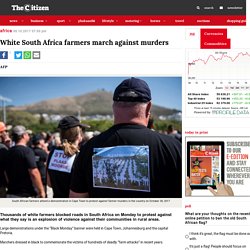
Marchers dressed in black to commemorate the victims of hundreds of deadly “farm attacks” in recent years. The protest actions halted traffic on main roads and forced police to divert vehicles on several major routes. Monday’s day of action was coordinated by AfriForum, a campaign group that advocates for its largely white membership, many of whom speak Afrikaans. It lobbies on issues including farm murders, hate speech and language rights, and is often critical of the African National Congress party, which has ruled South Africa for over two decades. The group said in a statement that there have been 72 farm murders this year. South Africa Map / Geography of South Africa / Map of South Africa. Archeologists report evidence that humans have inhabited Southern Africa for more than 100,000 years.
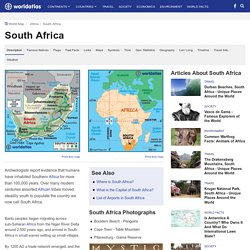
Over many modern centuries assorted African tribes moved steadily south to populate the country we now call South Africa. Bantu peoples began migrating across sub-Saharan Africa from the Niger River Delta around 2,500 years ago, and arrived in South Africa in small waves setting up small villages. By 1200 AD a trade network emerged, and the premise of a sacred leadership took hold. Then, in 1487, Bartolomeu Dias, a Portuguese explorer, became the first European to land in southern Africa. However, it wasn't until 1652, a century and a half after the discovery of the Cape Sea Route, that the Dutch East India Company founded a station at what would later become Cape Town.
The Dutch used the port primarily to transport slaves from India, Indonesia and Madagascar to be used as laborers for the colonists. South Africa. Education in South Africa. According to the Bill of Rights of South Africa's Constitution, all South Africans have the right to a basic education, including adult basic education and access to further education.
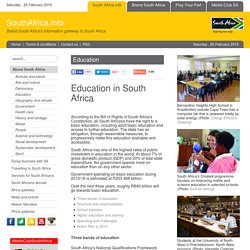
The state has an obligation, through reasonable measures, to progressively make this education available and accessible. South Africa has one of the highest rates of public investment in education in the world. At about 7% of gross domestic product (GDP) and 20% of total state expenditure, the government spends more on education than on any other sector. Government spending on basic education during 2015/16 is estimated at R203 468 billion. Over the next three years, roughly R640 billion will go towards basic education.
The School System. A child may begin schooling with grade 0 (also called reception, or grade-R) from the age of four.

Grades 1 to 9 are compulsory and classified as General Education and Training (GET). Grades 11 and 12, Further Education and Training (FET), are non-compulsory; qualification at this level with a matriculation certificate is required to enter tertiary education. Some schools offer a post-matric/sixth-form level which allows students to sit for A-level exams.
All About South Africa. Jun 08, 2010 Seeing as the 2010 FIFA World Cup happened in South Africa, we thought it’d be cool to learn a bit more about the beautiful country, which has definitely been through its fair share of tough times.
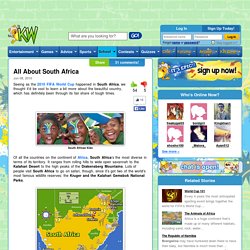
South African Kids Of all the countries on the continent of Africa, South Africa’s the most diverse in terms of its territory. It ranges from rolling hills to wide open savannah to the Kalahari Desert to the high peaks of the Drakensberg Mountains. Lots of people visit South Africa to go on safari, though, since it’s got two of the world’s most famous wildlife reserves: the Kruger and the Kalahari Gemsbok National Parks. Apartheid Museum. South Africa profile - overview. South Africa has one of the continent's biggest and most developed economies.
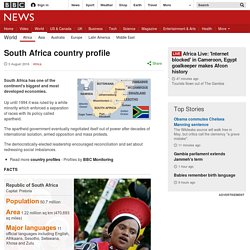
Up until 1994 it was ruled by a white minority which enforced a separation of races with its policy called apartheid. The apartheid government eventually negotiated itself out of power after decades of international isolation, armed opposition and mass protests. The democratically-elected leadership encouraged reconciliation and set about redressing social imbalances. Read more country profiles - Profiles by BBC Monitoring. FARVALBAFANA.PDF. Nelson Mandela - Biography - President (non-U.S.), Writer, Civil Rights Activist. Nelson Mandela became the first black president of South Africa in 1994, serving until 1999.
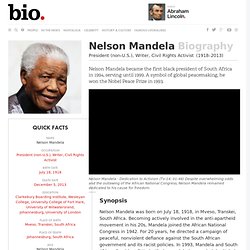
A symbol of global peacemaking, he won the Nobel Peace Prize in 1993. Synopsis Nelson Mandela was born on July 18, 1918, in Mveso, Transkei, South Africa. Becoming actively involved in the anti-apartheid movement in his 20s, Mandela joined the African National Congress in 1942. Robben Island Interactive. Robben Island. Robben Island Robben Island was used at various times between the 17th and 20th centuries as a prison, a hospital for socially unacceptable groups and a military base.
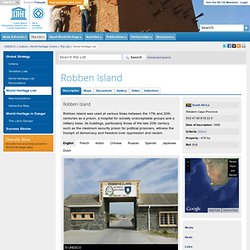
Its buildings, particularly those of the late 20th century such as the maximum security prison for political prisoners, witness the triumph of democracy and freedom over oppression and racism. Robben Island a été utilisée à différentes époques entre le XVIIe et le XXe siècle comme prison, hôpital pour les malades socialement indésirables et base militaire. Ses bâtiments, et en particulier ceux du XXe siècle, la prison à haute sécurité pour les prisonniers politiques, témoignent de l'oppression et du racisme qui régnaient avant le triomphe de la démocratie et de la liberté. جزيرة روبن تمّ استعمال جزيرة روبن خلال مراحل مختلفة بين القرنين السابع عشر والعشرين كسجن وكمستشفى للمرضى غير المرغوب بهم اجتماعياً وكقاعدة عسكرية. Source: UNESCO/ERI 罗布恩岛.
Robben Island. For nearly 400 years, Robben Island, about 12 kilometres from Cape Town, was a place of exile where rulers sent those they regarded as outcasts and troublemakers.
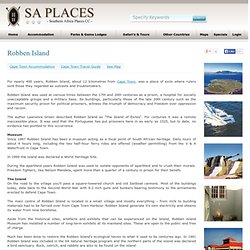
Robben Island was used at various times between the 17th and 20th centuries as a prison, a hospital for socially unacceptable groups and a military base. Its buildings, particularly those of the late 20th century such as the maximum security prison for political prisoners, witness the triumph of democracy and freedom over oppression and racism.
The author Lawrence Green described Robben Island as "The Island of Exiles". For centuries it was a remote inaccessible place. It was said that the Portuguese has put prisoners here in as early as 1525, but to date, no evidence has pointed to this occurrence. Video Robben Island. Primary History - Famous People - Nelson Mandela. Apartheid Explained.